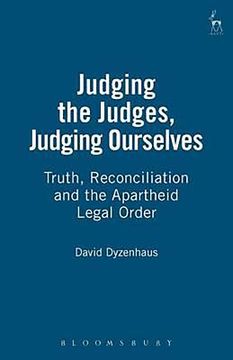judging the judges, judging ourselves: truth, reconciliation and the apartheid legal order
Synopsis "judging the judges, judging ourselves: truth, reconciliation and the apartheid legal order"
The Truth and Reconciliation Commission (TRC), established in South Africa after the collapse of apartheid, was the bold creation of a people committed to the task of rebuilding of a nation and establishing a society founded upon justice, equality and respect for the rule of law. As part of its historic, cathartic mission, the TRC held a special hearing, calling to account the lawyers - judges, academics and members of the bar - who had been crucial participants in the apartheid legal order. This book is an account of those hearings, and an attempt to evaluate, in the light of theories of adjudication, the historical role of the judiciary and bar in the apartheid years. Written by a well-known commentator on the South African legal system who became, by chance, the first witness to give testimony at these hearings, this book reveals, often in the words of those who testified, how the judges failed in their duty to uphold the rule of law. For the most part, the lawyers of apartheid deserted its victims. The few notable exceptions both illustrate the potential for lawyers to have done more and laid the basis for the respect the rule of law still enjoys in South Africa despite apartheid. Yet, as the author shows, many continue to commit a more serious crime. Failing to confront the past, and in many cases refusing even to attend TRC hearings, the lawyers who could have helped to resist the worst excesses of apartheid remain accomplices to its evil deeds. This book offers us the spectacle of and entire legal system on trial. The echoes from this process are captured here in a way which will appeal to all - readers, lawyers and non-lawyers alike - interested in the relationship between law and justice, as it is exposed during a period of transition to democracy. The themes dealt with here will also be of considerable interest to scholars, practitioners and judges interested in the debate about judicial independence, a debate which now rages throughout the common law world.

